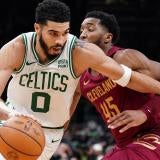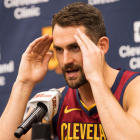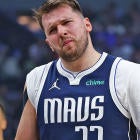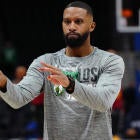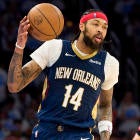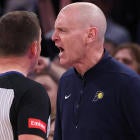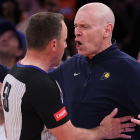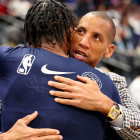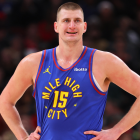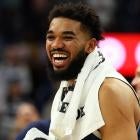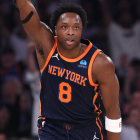NEW YORK -- For the first nine years of his career, Kevin Love couldn't see what he sees now. It took a panic attack during a game for him to give therapy a try, a story he told in The Player's Tribune in March of 2018 and has repeated in many forums since. Now in his 12th season, his sixth with the Cleveland Cavaliers, Love is not only more insightful about his struggles than he was before publicly sharing them, he is a more perceptive teammate.
"It's opened my eyes in being able to see in younger players stuff that's going on," Love tells me after a shootaround. He doesn't like to make assumptions, he says, citing Don Michael Ruiz's "The Four Agreements," but he can sense when other Cavaliers are having trouble. I ask if he ever looks at them and sees Minnesota Kevin.
"Oh hell yeah," he says. "And I had terrible habits. Not even just on the floor but off. I'd eat poorly. I'd stress eat. I'd eat when I had anxiety, which was really bad. I mean that's why I was essentially bigger. And you connect the dots looking back, as far my depression goes. I wasn't battling that at all; I was just letting myself go into a hole for two, four, six, eight weeks at a time and wouldn't take myself out until that other Kevin -- which is like the Good Kevin [who] allows himself to see different things and see the world -- is there. But it's a vicious cycle, especially when you don't see past those blinders that are on."
The Good Kevin can take a step back and put things in perspective, a necessary skill at this particular moment in his professional life. At 31, Love is closer to the end of his career than the beginning, on a team that is 17 months removed from playing in the Finals and lightyears away from returning there. Love signed a four-year, $120 million contract extension after those Finals, but that didn't stop potential trades being bandied about as if one is inevitable. Last week on ESPN's "The Jump," ex-Cavalier Richard Jefferson said he thinks his close friend and former teammate "is going to be a trade piece for someone. You just don't know who and where."
If Love is distracted by the speculation or worried about maximizing his remaining years in the league, he is not showing it. John Belein, Cleveland's new coach, says he has enjoyed watching Love engage with young players "as we're trying to set a culture here that's lasting forever." Through 10 games, he is averaging 18.5 points, 12.9 rebounds and 3.4 assists with a career-high 62.6 percent true shooting percentage. In a throwback to his Wolves days, the Cavs' starters have a plus-14.6 net rating. On Sunday they blew out the hapless, helpless New York Knicks 108-87 to improve to 4-5 on the season; on Tuesday they lost a heartbreaker in Philadelphia in which Love missed the would-be game-winner and expressed his frustration in a healthy way: with an "American Psycho" reference on Instagram.
It is easy to find professional athletes who extol the virtues of yoga, clean eating and a clear mind. Concepts rooted in sports psychology and performance psychology pop up in motivational quotes on social media and soundbites offered in post-game interviews. From "The Inner Game of Tennis" to "The Subtle Art of Not Giving A F*ck," books that help players avoid overthinking, move on from missed shots and center themselves are passed around the NBA. The list of players who have promoted getting therapy, though, is comparatively short. To Love, there is a direct link between how he's playing and the work he's done on his mental health.
"My behavior therapy and my talk therapy has really helped me see not only the bigger picture, but sometimes when you just lay it out there, you realize, wow," Love says. "Like, either it's not so bad or here's ways that I'm going to work towards my end goal, which is changing my relationship with my acute anxiety or my depression or my relationships in my life."
No one knows exactly how long Love will be a Cavalier, but he has pledged to do right by the city of Cleveland. As long as he is there, he will be invested. He will, as much as he can, live in the moment.
"Staying present is not an easy thing to do," Love says. "I think we all try and find that. But my biggest thing is just finding balance."
Merely hearing a five-time All-Star and NBA champion say the phrase "work-life balance" out loud is refreshing, as the lifestyle and culture of the league do not encourage it. Even Love, though, is careful not to imply that he is treating his job like, well, a job. He describes basketball as "my life." He says it's his "No. 1 pillar," his "core competency," and he "really, really, really" loves it. Love is intimately familiar, however, with the diminishing returns of obsession. He has learned to let himself take mental breaks, finding pockets of time to step away from the game so that he will have more energy to put into it.
"If I'm in the season and it's just basketball, if that's going bad, then what else do I have?" Love said. "There's only so many movies and TV shows and books in the world. You have to have other things that you're into."
Increasingly for Love, those things are advocacy and philanthropy. "People put us in that superhero category, like we're these huge athletes that can't get hurt," and he wants to change that. Aiming to help athletes and non-athletes alike, Love launched the Kevin Love Fund on World Mental Health Awareness Day in 2018, partnering with the meditation app Headspace and supporting foundations aimed at eliminating the stigma around mental health in high schools and colleges. He has delivered his message in conversation with Charlamagne Tha God at the 92nd Street Y, on an episode of HBO's "The Shop," at the Aspen Ideas Festival and in front of Tufts University students for a New York Times discussion series. This month he is on the cover of the National Institutes of Health's magazine. Last year he told ESPN's Jackie MacMullan he has found his life's work.
"Playing all my cards has allowed me to be a lot more settled in because I feel like there's very few things that I'm not prepared for that could hurt me," Love says. "I also believe the sense of community and the commonality in it has made me aware that there's a bigger purpose at hand. So I think that's allowed me to just kind of see life bigger than basketball."
Love has a mantra: "Only by admitting who you are do you get what you want." He is on medication. He meditates. He prioritizes nutrition and sleep. When he gets worked up, he has coping mechanisms learned through therapy. In the offseason, he turns into a globetrotter with a small "g," which last summer inspired endless jealousy, a perfect, viral tweet and a Times feature by Alex Wong in which, based on his affinity for the aesthetic of Jackson Hole, Wyoming, he swore he must have been a cowboy in a previous life. As for Love's future in this one, it is hazy only in that no one knows what jersey he'll be wearing in a few months. (Another close friend and former teammate-turned analyst, Channing Frye, suggested Cleveland could make the playoffs.) In a broader sense, Love has more clarity than ever before.









